- Home
- Chuck Palahniuk
The Invention of Sound Page 5
The Invention of Sound Read online
Page 5
At the mention of the name, Mitzi pictured the waitress from the diner but nothing more.
“She’s at peace,” said the doctor. “And you are forgiven because your actions have delivered her to a place of bliss and fulfillment beyond any she’d known on Earth.”
Ready for the next part of the ritual, Mitzi took a pad of paper and a pen from her handbag.
The doctor studied the ashes. “Her parents reside at 947 East Placer Drive in Ogden, Utah.”
Mitzi jotted down the address and waited.
“They owe,” the doctor announced, “approximately eighty-five thousand on their second mortgage and thirty-one thousand on their originating.”
Mitzi made a note to send two hundred thousand in cash. Her money room at the condo was as packed as any hoarder’s warren. Stockpiled were so many bales and cartons of banded five-hundred-dollar bills, a person could hardly venture a step within the door. She scratched out the first number and resolved to send an anonymous carton containing three hundred thousand.
The smoke shifted, swirled and eddied in the small room like so many ghosts. A bitter smell. Legions of lost souls crowding around them. Mitzi tried not to inhale.
At the sink the doctor turned on the taps and used his fingers to direct the water so that it washed the ashes toward the drain. He dried his hands with a paper towel and pulled on a pair of latex gloves. Next, he opened a drawer and produced a blank sheet of paper, an envelope, a pen.
Placing the paper on the countertop, he spoke as he wrote, “Dear Mummers and Paw-paw…” This voice wasn’t his own. It twanged and drawled. Neither was the handwriting his. The letters looped in the style of a high school student.
Mitzi had witnessed this before, too often to keep track of. Automatic writing channeled from the spirit world.
“Don’t try to find me,” continued the doctor. As he filled the page, Dr. Adamah said, “I love you and me-maw so much.” These same words looped and scurried across the page. “She may not know it, but little Braylene is carrying a child, and she must marry the boy. It’s decreed.” The florid handwriting paused.
The doctor turned over the sheet and continued on the reverse side. “I will greet all of you, very soon, and we will all share our love forever.” Dr. Adamah signed the letter with the name Shania.
His latex-gloved hands folded the paper and slipped it into the envelope. He wet a fingertip in the sink and rubbed it along the glue strip to seal the letter inside.
Not that Mitzi could make sense of it all, but the words of the letter washed her with a warm comfort. They seemed to absolve her of sins that Mitzi had made sure she couldn’t recall. She knew not to ask for details. She didn’t want to know more.
The doctor plucked a tissue from a box and wrapped the tissue lightly around the letter before offering the wrapped envelope.
Mindful not to leave fingerprints, Mitzi accepted it.
At the tail end of evening rush hour, Foster pulled to the curb. In front of the Student Union building she stood clutching a thick textbook. She waved and shouted, “Dad! Over here!” If the book was real or a prop, it was a nice touch.
She leaned in the driver’s-side window and gave him a peck on the cheek. She darted around the front of the car and climbed in the shotgun seat. Clicked her seat belt. Placed the book between them on the seat. She was wearing the birthday pearls.
Foster panicked at the idea that without her to recite his stories, he’d forget them. But maybe that was the goal all along.
As he checked his side mirror and signaled to pull out, he asked, “Do you remember the pony we rented?”
He wanted to start her on easy events. Like testing her in some obscure catechism. First, the pony episode. Then, the roasting pan lesson. The Gospel of Lucinda. He’d drilled her until she must’ve known Lucinda’s childhood better than she knew her own. He reached the book next to his hip and flipped it open. A text on the Dramatic Arts. He lay the usual fee between the pages and closed it.
As if unaware, she looked away, observing the buildings they passed. The people who lined the sidewalks.
Perhaps she was buying time to think. But now, her eyes bright with confidence, Lucinda threw herself into the role. “The pony? Of course I remember. Dog Biscuit.” The correct name of the pony. “My last day in second grade.” The correct occasion. “I wore these brand-new Keds I didn’t want to get dirty—”
“They were red,” Foster interrupted.
“They were blue. Light blue.” She was right.
He wasn’t trying to trip her up. He’d muffed a detail of something precious, and it scared him to think she knew his child’s life better than he did. He shifted the conversation to something more obscure. “Remember Halloween?”
She asked, “Which one?” Guarded. A student undergoing a pop quiz.
“Your first,” Foster coached her as he sailed the car through traffic. “When you were four.”
This Lucinda brought a hand to her mouth and bit her thumbnail. She closed her eyes in concentration. Insisted, “Don’t tell me.”
Foster urged her along. “You were a witch.”
“No.” She drew out the word, stalling. Triumphant, she cried, “I was an elf!”
Unnerved, Foster changed lanes abruptly. A horn honked behind them. “You were?” He was losing hold of his most valuable possessions, his memories.
This Lucinda chided, “I wore my pink footy pajamas and my pink tutu from ballet class, you remember.” Now she was dictating his memories. This imposter had taken authorship of his past.
He couldn’t argue. He didn’t remember. For the first time, he turned the tables. “Now you choose a story.”
She touched a fingertip to her smooth forehead. “Remember…the Christmas when your brother played Santa Claus?”
He couldn’t and felt a flash of anger. He’d given away his child’s life to this stranger. She knew Lucinda’s life backwards and forwards.
She wasn’t being cruel. Only blushed as if embarrassed on his behalf. Timidly she asked, “You remember my guinea pig?”
He poked around in his memory the way a person feels for a light switch inside the doorway of a dark room. Foster brightened. “Ringo.”
Concern clouded her face. “Rufus,” she corrected. Right again. They drove in silence for a few blocks. Almost at their destination, she asked, “Where are we headed, Dad?”
On the lookout for a parking space, he told her, “Don’t call me that.” Suddenly he’d broken character. She’d learned the game too well, and he was losing this contest. It felt like a classic reversal: the parent becoming the child, the child lecturing the elder.
A space opened up and he pulled the car into it. She glanced at her phone, if only to check the time. This was going to be a long hour.
“Thank you,” she said, her voice hushed. “For the pearls, I mean.” She touched them as if afraid he might want them back.
He lifted her book from the seat. “You recognize this?” He nodded over the steering wheel to indicate an office tower down the block. A building as bland as a tombstone.
She leaned forward to peer through the windshield. “It’s the Parker-Morris Building,” she said, “where Daddy—where you used to work.”
He climbed out of the car, carrying the textbook as bait so she’d follow. Striding down the sidewalk, he shouted back over his shoulder, “Do you remember how you got lost that one time?”
She climbed out her side and scurried after him.
“Yes,” he continued, outdistancing her, “your mother and I never thought we’d find you again.”
Rushing to keep pace, this Lucinda chirped, “It was Daddy-Daughter Day at your office…”
Without slowing, he demanded, “And?”
Stumbling between other pedestrians, now uncertain, she answered, “I wanted to play a game? I wanted to play elevator tag.”
They’d arrived at the doorway to the tower. She kept reaching toward the book he held. Because she was actually a drama
student or because her money was inside it, Foster couldn’t tell. “Lucinda?” he asked. “You want to play a game with Daddy?”
Jimmy she dated for his legs. He had long legs that made it easy to plant a foot against the back of her head. He’d rolled her facedown and yanked her naked hips into the air. Jimmy, he’d only needed to watch the video once. Jimmy with his gummy dreadlocks and pockmarked cheeks. His nose like something found pickled in a jar after a hundred years. The whole of his lanky, leathery nakedness like something excavated from a peat bog. He never asked about the bruises left over from the last one. Or the scars on her arms and back from the ones before that. Jimmy had just watched the video on her monitor at the Fontaine. For men porn was like a tutorial.
The tiny man on the screen rolled the tiny woman facedown. He pulled her butt up until she was on her knees, but kept her face pinned to the floor by planting one tiny foot on the back of her tiny head. His other foot remained on the floor, and he bent that knee, lowering himself to sodomize her. Not everyone could mimic the position, but Jimmy could.
Like someone learning to dance, he’d carefully rolled her over and placed his bare foot on the back of her head. They were on the floor. The bed was too wiggly. Mimicking the video, he’d spat on her upturned asshole. His aim, warm and dead center. This, already an improvement over the Gypsy Joker who’d chewed tobacco.
His balance wavering, he wedged the head of his erection against her. For a moment half his body weight was drilling into her as he bent his other leg to lower himself. The pressure of his foot drove down on the nape of her neck, drove Mitzi’s mouth into the carpet. Muffling her words as she insisted, “Harder! Step harder!”
The wine in her stomach surged up her throat, but she choked it back down. Wine burning with bile and sleeping pills. She tried to twist her head and get more foot-stomping pressure against her cervical vertebrae.
An internal decapitation is what she was angling for. It’s why she’d trekked down to Riverside and braved the death glares of local homegirls until she’d met Jimmy. Jimmy with his long legs and his toenail fungus shoved tight against her jaw. The one before, the Gypsy Joker, even with his swagger and his meth-fueled need to fuck, he hadn’t the lower body strength. Weren’t motorcycles supposed to build up thigh muscle? He might take a couple halfhearted stomps against the back of her head. She could kick the heavy bag at the gym harder. Beyond that, he’d slap her around and choke her until she blacked out, but she’d always awoke to find him snoring in her bed.
What more was there to say? The Gypsy Joker’s skin was so pale and he’d so little body hair that his abundant tattoos made him look like someone’s wedding china. She’d find handfuls of her hair ripped out. Her scalp ached. No matter how many times she’d sat him down and made him watch the video, he’d only managed to knock out one of her front teeth and give her a small anal fissure that bled like the bejeezus and took over a month to heal.
Jimmy grunted. The man in the video said, “Give me that hole” and slapped the woman’s ass.
Jimmy said, “Gimme that hole, bitch” and slapped Mitzi’s thigh.
They were, both of them, slick with sweat. And they’d been drinking wine so chances looked good. With each withdraw of his erection he lifted his center of gravity too high and threatened to topple. His was basically a three-point stance, like a milking stool, and any slip might force all of his weight against the fragile top of her spine.
Something popped inside her head, a popping sound, and blood flooded her mouth. But instead of her backbone, her nose had broken against the floor. Crushed sideways against the carpet, the cartilage had snapped with a crunch not unlike a dried crab claw.
A perfect sound effect wasted. Her mind, again, wandering, she wondered, If a nose was broken in the forest and no one was there to record it and dub it into a film, did the nose really break?
Foster let her assume the worst. He waved her into an elevator car and said, “Go up. Go down. Switch elevators. But if I catch you, you’re dead.” He reached inside his jacket and slid the pistol from its shoulder holster. Robb’s gun. It wasn’t loaded.
Security was still a joke here. Then as now, no guard manned the desk. The bank of security monitors showed empty hallways in grainy black and white. On one screen, he saw himself holding the gun, balding, his eyes bulbous behind the thick lenses of his glasses, one veined hand holding the gun. No one watched him. Only he watched.
Let the police come arrest him. The police wouldn’t come. This wasn’t that kind of world, not anymore. Maybe it never had been.
The gun was necessary to terrorize her. If this Lucinda feared him, she’d never phone him in the future. She’d never reappear just to say hello and chat about old times. He couldn’t beat his addiction to her. She had to be dead to him.
She looked at him, cocked her pretty head. Whether she was truly an excellent actor or she saw something ruthless in his face, she blinked back tears. She looked over his shoulder as if for help, then reached forward and pressed the button for a floor. Backed slowly against the rear of the car.
“Use your phone,” he warned her, “pull a fire alarm. But stay in one spot too long, and I’ll find you before the police do.”
Foster did what he should’ve done so long ago. Instead of giving chase he waited.
Her doors slid shut and the car began to rise according to the floor indicator. There in the lobby, a panel of stainless steel showed vertical rows of red lights, each marking the location of a different elevator. The car she’d boarded stopped on the seventeenth floor. Another light stopped on the same floor, then proceeded down a few floors. Clearly she’d switched cars to evade him.
The small red lights traced her path of escape, bobbing and weaving, bursting from an elevator on one side of the building to dash into another elevator and ride down or up further. Then, to switch cars once again.
What he did today would keep her running away from him for the rest of her life.
Foster’s guess was that she’d panic soon. She might call the police or her pimp, but she’d never linger in one place lest Foster find her. His gut was right. One elevator was plummeting, an express straight for a lobby escape.
Watching it fall, Foster remembered how he’d chased his daughter during her long-ago game. He’d catch sight of her only as she ducked squealing into a different car. He’d make a grab for her, but she’d be gone. It was fun, he’d thought. A game.
It never occurred to him to call security and ask them to seal the exits. How long had she been gone while he still ran panting and laughing to catch her? Like an idiot, he’d been calling her name, and chasing after a phantom.
Still holding the textbook, Foster positioned himself in front of the arriving car.
The doors slid aside and she lunged forward, almost colliding with him. Stopping short, she fell backward. Slid down to the carpeted floor. Curled herself into a defensive ball, sobbing, “Please, Dad!” Sobbing, “Don’t.”
Foster drew the pistol from inside his jacket and put the muzzle of it very gently against the top of her head. That wonderful dark hair. He said, “You’re not my kid. …And you’re no actor.” To seal the deal, to really make her despise him, he added, “You’re a whore. A two-bit, dirty, cock-sucking whore.”
She stopped crying and tilted her face up until the gun was aimed between her eyes. Any fear there had been replaced by fury. Whether or not he killed her, this Lucinda wanted to kill him. That was good. That was perfect.
From Oscarpocalypse Now by Blush Gentry (p. 45)
People, they loved Mitzi Ives. Loved her. Even after the FBI discovered that room packed full of money, people could still give her the benefit of the doubt. She lost her mother as a little baby. Her dad ran out during her teens, but Mitzi, she never went under. Maybe because her life was so hard, she turned out a survivor, you know?
Of course people started rumors. Anytime a woman, a single young woman makes it in Hollywood, the haters are going to trash-talk her. They’l
l say she fucked her way to the top in Foley work. Either that, or haters say she’s a sadistic serial killer. They still say that. Rumors, I never paid any attention to.
No, my passion is chromium diopside. Why buy into all the haters and their jealousy when you can flaunt all the glamour of old Hollywood at a price point that makes our jewelry the best investment a swank, savvy, fashion-forward woman can own? Our motto is: More Emerald than Emeralds. But let a strong, smart woman get to the lead position in any industry and the legacy media will say she got there by torturing people to death. Just look at Sheryl Sandberg.
For those haters who say Mitzi Ives was a killer, I have just one question. “What happened to the bodies?” Show me all those dead bodies.
Jimmy hated sitting in the middle. The people, he complained, the ones seated behind them would kick his seat by accident. The ones sitting on either side would elbow him without thinking, or they’d whisper. The people sitting in the row in front of him would be too tall. No, the center of any theater might be the best viewing location from which to watch a movie, but the benefits were outweighed by the distractions. This was the reason home theaters were exploding.
“Tonight will be different,” Mitzi told him. “Trust me.”
Jimmy didn’t understand about the rough cut. About the screening of the rough cut. He was just excited to get a pass onto the studio lot. She’d tried to dampen his spirits by explaining. This was no tuxedo-and-klieg-lights event. They’d be watching the prerelease cut of a Civil War picture. And not a particularly good one. And no one would be dressed any better than any casual Friday.
Not that Jimmy knew what a casual Friday was. The best he could muster was a clean do-rag wrapped around his caked dreads.
Why they’d been invited to this shindig, Mitzi couldn’t fathom. Every evening was a choice between reading a classic book or going out to an industry event. In brief: whether to spend her time with smart dead people or alive idiots.

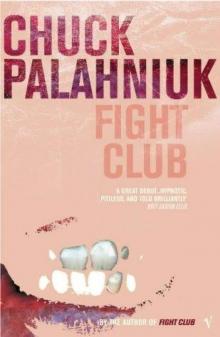 Fight Club
Fight Club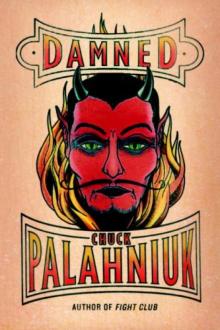 Damned
Damned Tell-All
Tell-All Choke
Choke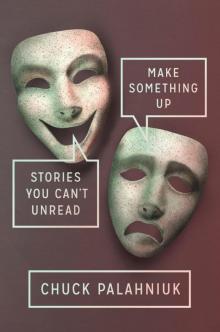 Make Something Up: Stories You Can't Unread
Make Something Up: Stories You Can't Unread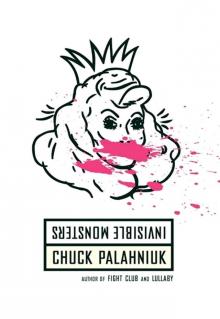 Invisible Monsters
Invisible Monsters Phoenix
Phoenix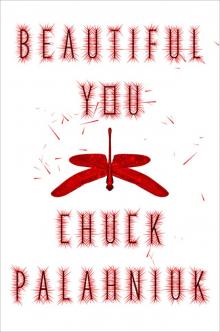 Beautiful You: A Novel
Beautiful You: A Novel Haunted
Haunted Survivor
Survivor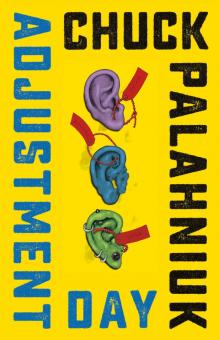 Adjustment Day
Adjustment Day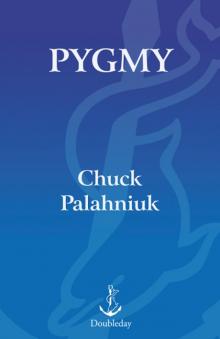 Pygmy
Pygmy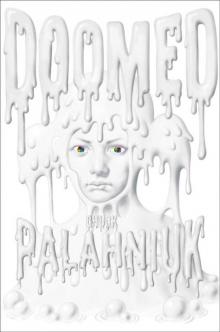 Doomed
Doomed Lullaby
Lullaby Snuff
Snuff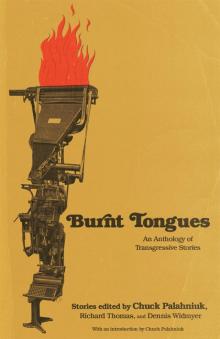 Burnt Tongues
Burnt Tongues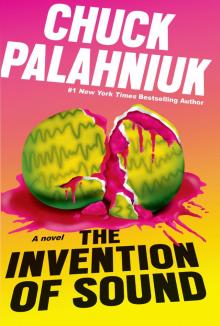 The Invention of Sound
The Invention of Sound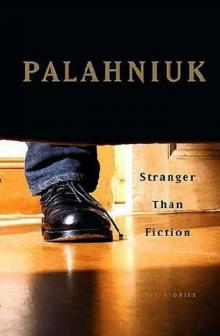 Stranger Than Fiction (True Stories)
Stranger Than Fiction (True Stories) Rant: The Oral History of Buster Casey
Rant: The Oral History of Buster Casey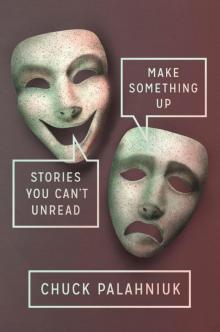 Make Something Up
Make Something Up Rant: An Oral Biography of Buster Casey
Rant: An Oral Biography of Buster Casey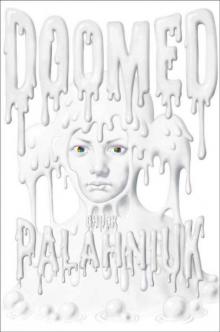 Doomed d-2
Doomed d-2 HOPE AND GORY
HOPE AND GORY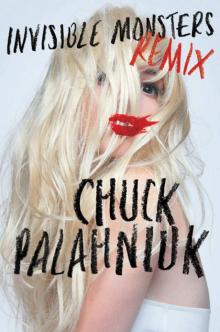 Invisible Monsters Remix
Invisible Monsters Remix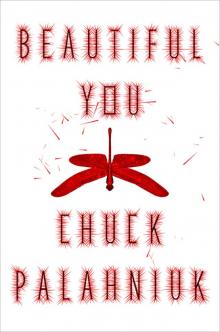 Beautiful You
Beautiful You Fugatives & Refugees
Fugatives & Refugees